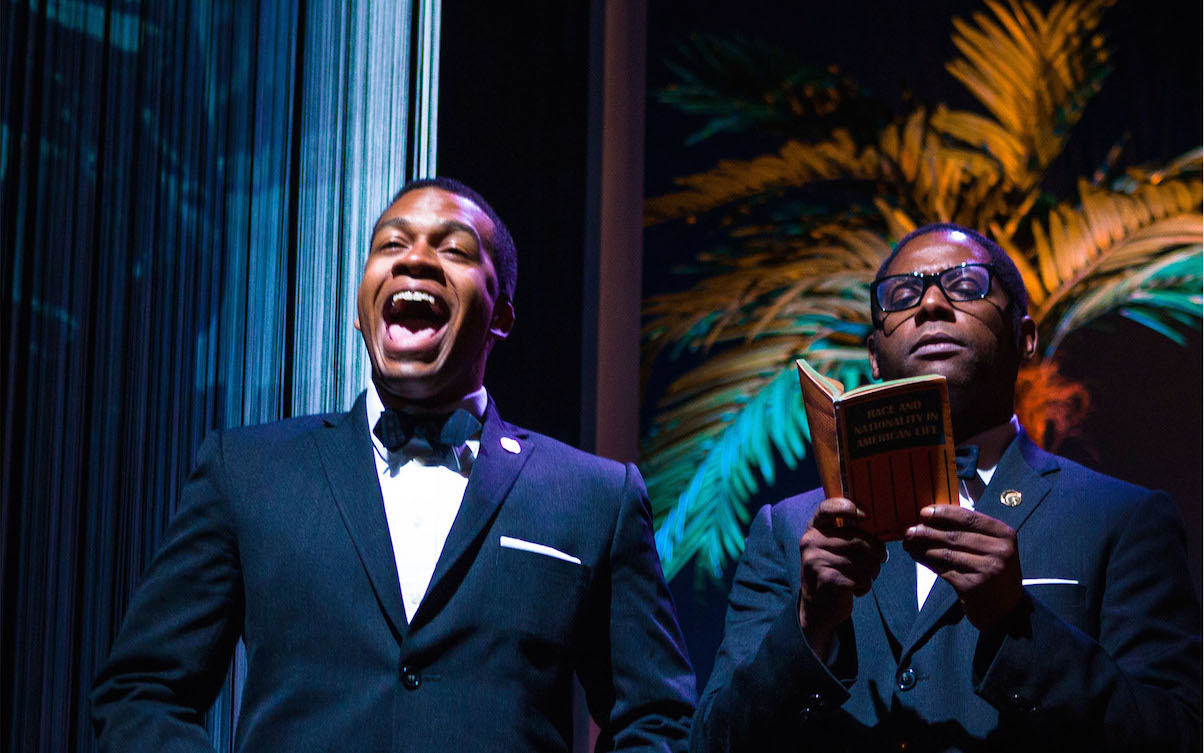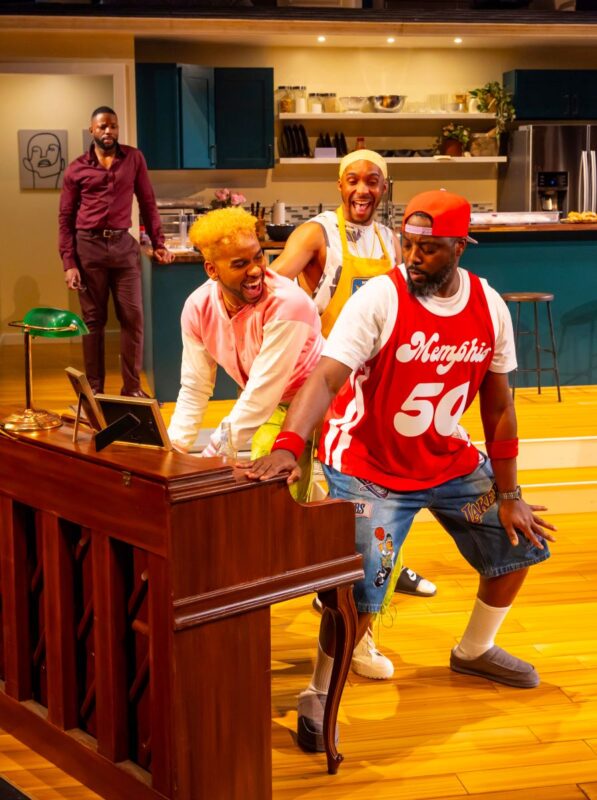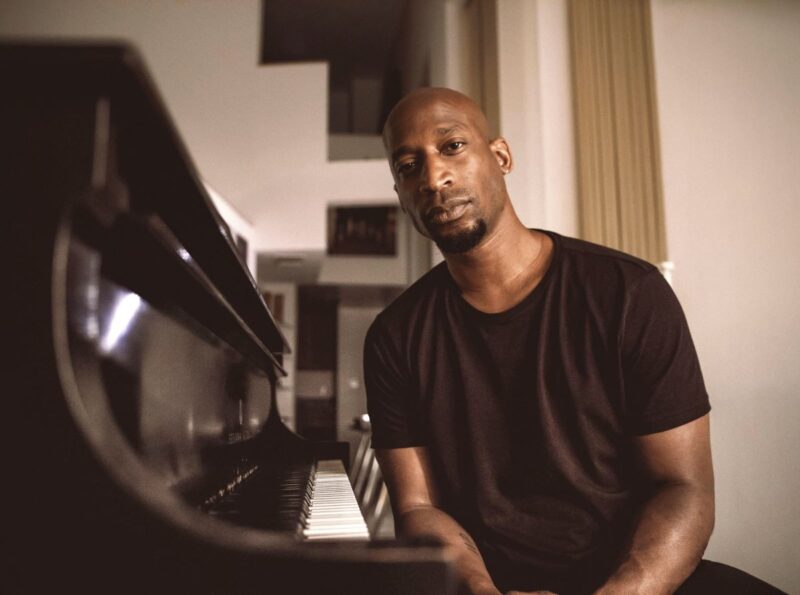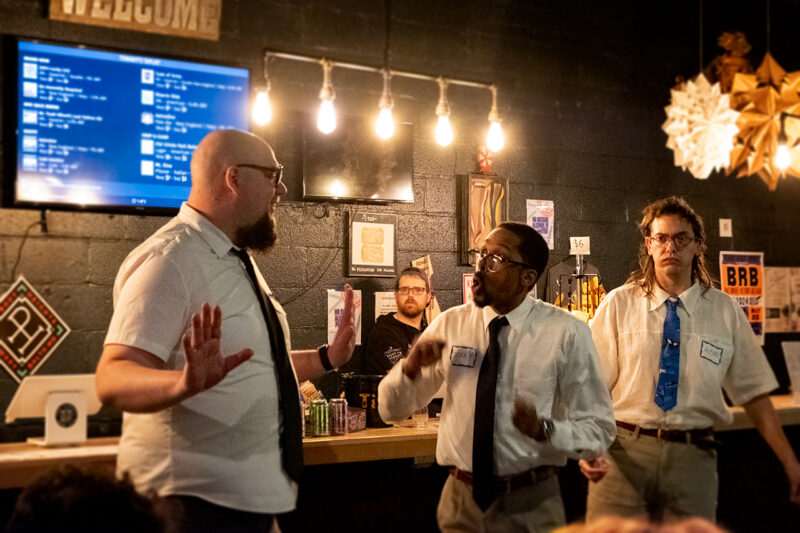Bret McCabe reviews One Night in Miami... at Center Stage
Four African-American guys get together to party, though it doesn’t exactly feel like one at first. They gather a hotel room in the Black part of town–nothing fancy, no girls, no booze. Instead, they talk, conversations that dart from silly to serious, occasionally getting heated, and everywhere in between. Sometimes they’re all of the above at once. One of the guys, a member of the Nation of Islam, asks another why he won’t consider joining them. He responds with two very good reasons: His grandmother’s pork chops and white women.
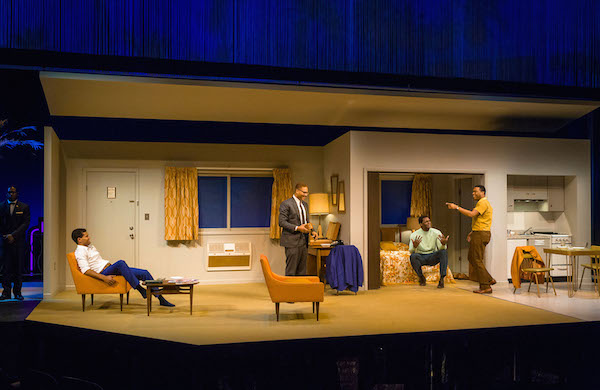
In Kemp Powers‘ One Night in Miami…, Center Stage currently has the most entertaining night in Baltimore theater going on right now. That Night is as thoughtful and intelligent as it is fun is a testament to Powers’ script, Center Stage artistic director Kwame Kwei-Armah’s direction, and the ridiculously capable cast.
The play is an imagined scenario based on something that really happened. On Feb. 25, 1964, a young fighter from Louisville, Ky., by the name of Cassius Clay defeated Sonny Liston, boxing’s reigning heavyweight champion. The bout took place in Miami Beach, and that night Clay met up with soul singer Sam Cooke, professional football player Jim Brown, and political activist Malcolm X. Nobody knows, exactly, what went on in that room night. What is known is that the next morning Clay announced that he was joining the Nation and that thereafter, he would be known as Muhammad Ali— and merely go on to redefine the impact a professional athlete can have on the culture at large.
Knowing what comes next is what makes Night such a rush. In Powers’ telling, the guys razz each other and shoot the shit. When Clay (Sullivan Jones) confides that he’s thinking about joining the Nation, conversations revolve around navigating the tightrope that is fame in America when the color of their skin trumps the immensity of their talents. Cooke (Grasan Kingsberry), the King of Soul, is the most famous of the bunch, a singer with a handful of R&B No. 1 singles but who has only cracked the Top 10 of the pop (read: “white”) charts twice— with the bubblegum of “You Send Me” and “Chain Gang.”
Malcolm X (Tory Andrus) challenges Cooke to be doing more than that—to raise consciousness, help his peers, use his talent and popularity to say something. Cooke points out that he started his own label, which licensed a song to the Rolling Stones— which became the British group’s first No. 1 hit in the UK and paid royalties back to the songwriters, the Valentinos Bobby and Cecil Womack. Cooke says he doesn’t simply want a piece America’s pursuit-of-happiness pie, “I want the whole damn recipe.”
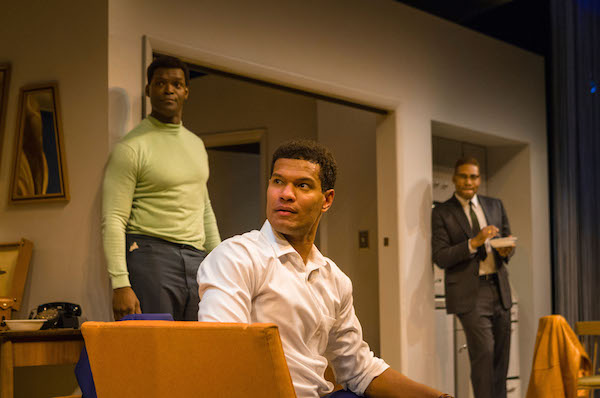
Between Cooke and Malcolm X squaring off, Brown (the superb Esau Pritchett), the only man in the room with a college degree, brings pragmatic insight to the discussion. He prefers the white man who wears his racism on his sleeve than the one who compliments his achievements on the football field while denying him entry into his home. Pritchett’s Brown is a towering, physical presence, a man who knows how to use his size to settle confrontations; he’s also a fountain of common sense. He tells Clay he’s getting tired of enduring the beatings that come with football, and confesses that he’s thinking about getting into movies.
All of the above discussions are considerations of a black individual confronting how he’s going to deal with American white supremacy and the stress and distress it inflicts on their fellow African-Americans and themselves. It’s an imperative as pertinent and vital now as then, and just as thornily knotted up in politics, class, and economics—arguably even more tied up in economic inequality now. Self change vibrates at the heart of this play— each man expresses doubts of how to move forward with their art, their politics, their careers— and we watch this imagined scenario with full awareness of the legends they become and the fates that await them: Cooke would be shot and killed the December of that year; Malcolm X assassinated the following February.
Night is journalist Powers’ debut play, and he brings to it a keen balance of empathy and adrenaline. He understands how the past haunts the present. He also remembers that being a young man sometimes feels like having an infinitely restless possibility powering the mind, which he infuses into his characters. That’s important, because it’s difficult to see the names Muhammad Ali, Jim Brown, Sam Cooke, and Malcolm X and not immediately access the long shadows their lives cast. On this 1964 night, though, they were young men— Clay was 22; Brown, 28; Cooke, 33; Malcolm X 39—in the process of becoming. And Powers wisely lets them be more young guys than argumentative chess pieces.
It helps that the entire cast is absurdly talented. Jones taps into the fearless charisma of the young Ali, exuberantly conveying the young fighter’s impetuous confidence and searching curiosity. Andrus impressively wears the inward weight of Malcolm X’s fierce intelligence in his body, the rift between the activist and Elijah Muhammad and the Nation of Islam chipping away as his psyche and posture. Pritchett balances Brown’s physical braggadocio with impeccable comic timing, making the running back a source of fearless swagger and sophisticated wit. And Kingsberry has the audacious poise not only to sing Cooke’s songs but the fearless cool to hit the notes, an impromptu concert in the middle of the play and a closing, a capella rendition of “A Change Is Gonna Come” providing emotional tent poles to the play’s charged exchanges.
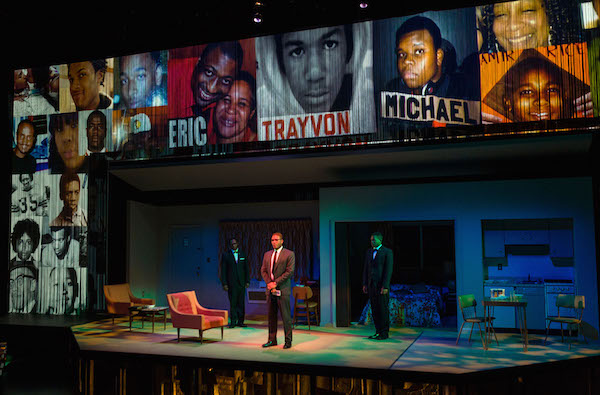
Those moments also serve of moving reminders of what’s at stake for these guys. Music, football, boxing, activism—such activities are what propelled them into popular consciousness but aren’t the only things that define them as men, and like any human, they don’t want to live one dimensionally, and the gripping, recognizably human drive of these guys is what’s on spotlight here. When Night debuted in the summer of 2013 in Los Angeles its reviews weren’t just positive but buzzed about its potential commercial appeal. Its understandable: here’s a briskly plotted 90-ish minute production powered by four klieg light characters. It’s totally movie material.
In the summer of 2013, though, four black guys talking about navigating white America didn’t bristle with the complications that it does today. Of course, in the summer of 2013 Michael Brown was just another 17-year-old kid about to start his senior year at Normandy High School outside of St. Louis, Mo. Center Stage’s One Night in Miami . . . ends with Malcolm X standing onstage as photos of Eric Garner, Trayvon Martin, Michael Brown, Tamir Rice, Emmett Till and other black men and women killed extra judiciously are projected onto a screen that borders the stage. It’s powerful quiet reminder not simply that the change Cooke sang about hasn’t come yet, but that for a long, long time now black America has been engaged in a conversation on race whether or not white America was paying attention or tweeting its solidarity.
One Night in Miami… has been extended through February 22, 2015 at Center Stage. Click here for more info.
Author Author Bret McCabe is a haphazard tweeter, epic-fail blogger, and a Baltimore-based arts and culture writer.
* Top Image: Genesis Oliver, Royce Johnson. Photo by Richard Anderson


